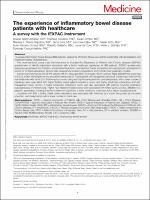The experience of inflammatory bowel disease patients with healthcare: A survey with the IEXPAC instrument
Author
Date
2019-04Permanent link
https://hdl.handle.net/11351/4172DOI
10.1097/MD.0000000000015044
ISSN
0025-7974
WOS
WOS:000467323600040
PMID
30946348
Abstract
To assess inflammatory bowel disease (IBD) patients' experience of chronic illness care and the relationship with demographic and healthcare-related characteristics.This cross-sectional survey used the Instrument to Evaluate the EXperience of PAtients with Chronic diseases (IEXPAC) questionnaire to identify parameters associated with a better healthcare experience for IBD patients. IEXPAC questionnaire responses are grouped into 3 factors - productive interactions, new relational model, and patient self-management, scoring from 0 (worst) to 10 (best experience). Scores were analyzed by bivariate comparisons and multiple linear regression models.Surveys were returned by 341 of 575 patients (59.3%, mean age 46.8 (12.9) years, 48.2% women). Mean (SD) IEXPAC score was 5.9 (2.0); scores were higher for the productive interactions (7.7) and patient self-management factors (6.7) and much lower for the new relational model factor (2.2). Follow-up by a nurse, being seen by the same physician, and being treated with a lower number of medicines were associated with higher (better) overall patient experience score, and higher productive interactions and self-management factor scores. A higher productive interactions score was also associated with patients receiving medication subcutaneously or intravenously. Higher new relational model scores were associated with follow-up by a nurse, affiliation to a patients' association, receiving help from others for healthcare, a lower number of medicines and a higher educational level.In patients with IBD, a better overall patient experience was associated with follow-up by a nurse, being seen by the same physician, and being treated with a lower number of medicines.
Keywords
Inflammatory bowel disease; Patients experience; Chronic diseaseBibliographic citation
Marín-Jiménez I, Casellas F, Cortés X, García-Sepulcre MF, Juliá B, Cea-Calvo L, et al. The experience of inflammatory bowel disease patients with healthcare. Medicine (Baltimore). 2019;98(14):e15044.
Audience
Professionals
This item appears in following collections
- HVH - Articles científics [4476]
The following license files are associated with this item:

 Private area
Private area Contact Us
Contact Us








